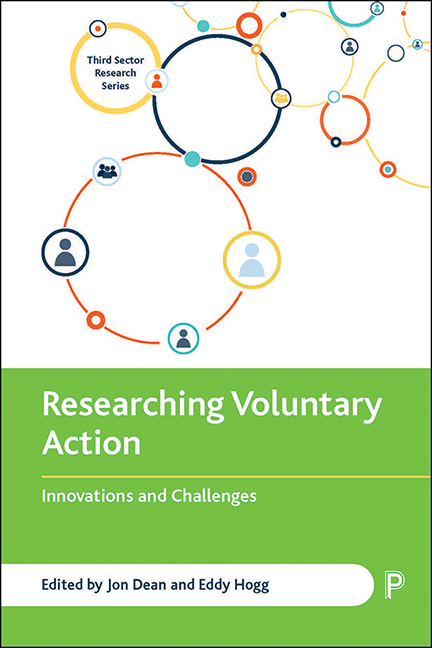Book contents
- Frontmatter
- Contents
- List of figures, tables and boxes
- Notes on contributors
- Acknowledgements
- Series editor’s foreword
- 1 Introduction
- 2 (Un)suitable methods and reflexive considerations: an interview and focus group study of youth volunteering
- 3 Interpretive ethnography: a UK charity shop case study
- 4 Collaborative philanthropy and doing practically relevant, critical research
- 5 Peer research: co-producing research within the context of voluntary and community action
- 6 Charity advertising: visual methods, images and elicitation
- 7 Using archives and objects in voluntary action research
- 8 Using Mass Observation as a source of qualitative secondary data for interdisciplinary longitudinal research on voluntary action
- 9 Investigating meanings and messages on volunteering through television media
- 10 Annual reporting in voluntary organisations: opportunities for content analysis research
- 11 Researching risk in the voluntary sector: the challenges and opportunities of regulatory data
- 12 Exploring the benefits of volunteering: combining survey and administrative data in the Nordic ‘laboratory’
- 13 Spatial approaches to the voluntary sector
- 14 Restudies, surveys and what counts as volunteering
- 15 Conclusion
- References
- Index
1 - Introduction
Published online by Cambridge University Press: 15 September 2022
- Frontmatter
- Contents
- List of figures, tables and boxes
- Notes on contributors
- Acknowledgements
- Series editor’s foreword
- 1 Introduction
- 2 (Un)suitable methods and reflexive considerations: an interview and focus group study of youth volunteering
- 3 Interpretive ethnography: a UK charity shop case study
- 4 Collaborative philanthropy and doing practically relevant, critical research
- 5 Peer research: co-producing research within the context of voluntary and community action
- 6 Charity advertising: visual methods, images and elicitation
- 7 Using archives and objects in voluntary action research
- 8 Using Mass Observation as a source of qualitative secondary data for interdisciplinary longitudinal research on voluntary action
- 9 Investigating meanings and messages on volunteering through television media
- 10 Annual reporting in voluntary organisations: opportunities for content analysis research
- 11 Researching risk in the voluntary sector: the challenges and opportunities of regulatory data
- 12 Exploring the benefits of volunteering: combining survey and administrative data in the Nordic ‘laboratory’
- 13 Spatial approaches to the voluntary sector
- 14 Restudies, surveys and what counts as volunteering
- 15 Conclusion
- References
- Index
Summary
‘Methodology is destiny’, wrote Rooney, Steinberg and Schervish (2004). As a reflection on their finding that when individuals are given more detailed prompts they better recall their previous charitable giving and volunteering, their three-word phrase sums up a central point about social research: if you ask better questions, you get better answers. Do the methodological groundwork, think through the possibilities, put more in, and you get more out. More impact. More esteem. And, most importantly, more understanding of our social lives and worlds. It seems fascinating therefore, that within the study of voluntary action (more on that term shortly), while the phrase ‘methodology is destiny’ has been applied twice more in our field (Bekkers and Wiepking, 2006; Li, 2017), research into voluntary action rarely seems to engage directly with issues of methodology. Obviously, academic and research debate happens between scholars all the time – discussions around the most appropriate dataset to use, or the best coding software or the right way to phrase a question about giving in a national survey – but methodological debates in the non-profit and voluntary action research networks and published reflection and learning are, in our view, relatively scarce.
This surprising lack of attention was one of the inspirations for putting together this volume on researching voluntary action. While all researchers give focus to methodology when collecting data or conceptualising their studies, considered and detailed methodological reflection and advice is generally lacking in voluntary action research journals (although we note that in the two to three years during which this volume has been in development that landscape has started shifting, with developed Research Note sections and special issues). This matters. Good methodology is key. It is key to assessing data validity and making inferences as to the ‘quality’ of academic findings. It is key too to replicating studies to test for validity in different times or contexts, this being an issue that is becoming increasingly important, especially in specific social research disciplines like psychology and economics (Open Science Collaboration, 2015; Bell et al, 2020). But perhaps most importantly, it is key because voluntary action research often (rightly) positions itself as on the side of the angels, especially when our research involves evaluating or assisting a charity aimed at improving the world.
- Type
- Chapter
- Information
- Researching Voluntary ActionInnovations and Challenges, pp. 1 - 11Publisher: Bristol University PressPrint publication year: 2022



